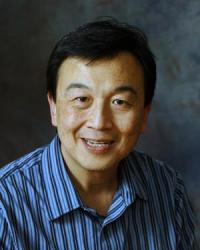Wen-mei W. Hwu received the PhD degree in computer science from the University of California, Berkeley, 1987. He is the Walter J. (“Jerry”) Sanders III-Advanced Micro Devices endowed chair of electrical and computer engineering at the University of Illinois at Urbana-Champaign. His research interests include the areas of architecture, implementation, software for high-performance computer systems, and parallel processing. He is a principal investigator (PI) for the petascale Blue Waters system, a codirector of the Intel and Microsoft funded Universal Parallel Computing Research Center (UPCRC), and PI for the world’s first NVIDIA CUDA Center of Excellence. He is the chief scientist of the Illinois Parallel Computing Institute and the director of the IMPACT lab.
For his contributions to the areas of compiler optimization and computer architecture, he received the 1993 Eta Kappa Nu Outstanding Young Electrical Engineer Award, the 1994 University Scholar Award of the University of Illinois, the 1997 Eta Kappa Nu Holmes MacDonald Outstanding Teaching Award, the 1998 ACM SigArch Maurice Wilkes Award, the 1999 ACM Grace Murray Hopper Award, the 2001 Tau Beta Pi Daniel C. Drucker Eminent Faculty Award, the 2006 most influential ISCA paper award, and the University of California, Berkeley distinguished alumni in computer science award. From 1997 to 1999, he was the chairman of the Computer Engineering Program at the University of Illinois. In 2007, he introduced a new engineering course in massively parallel processing with David Kirk of NVIDIA. He is a fellow of IEEE and of the ACM.

David B. Kirk is an NVIDIA Fellow and served as NVIDIA's chief scientist from 1997 to 2009, a role in which he led the development of graphics technology for today's most popular consumer entertainment platforms. He also serves on the U.S. Commerce Department's Information Systems Technical Advisory Committee. Kirk was honored by the California Institute of Technology in 2009 with a Distinguished Alumni Award, its highest honor, for his work in the graphics-technology industry. In 2006, he was elected to the National Academy of Engineering for his role in bringing high-performance graphics to personal computers. He received the SIGGRAPH Computer Graphics Achievement Award in 2002 for his role in bringing high-performance computer graphics systems to the mass market. Prior to coming NVIDIA, Kirk served from 1993 to 1996 as chief scientist and head of technology for Crystal Dynamics, a video game manufacturing company. From 1989 to 1991, he was an engineer for the Apollo Systems Division of HP.
Kirk is the inventor of 50 patents and patent applications relating to graphics design and has published more than 50 articles on graphics technology. He holds BS and MS degrees in mechanical engineering from the Massachusetts Institute of Technology, and MS and PhD degrees in computer science from Caltech.

Antonio J. Peña holds a BS + MS degree in Computer Engineering (2006), and MS and PhD degrees in Advanced Computer Systems (2010, 2013), from Jaume I University of Castellón, Spain. He is currently a Sr. Researcher at Barcelona Supercomputing Center (BSC), Computer Sciences Department. At BSC, Antonio works within the Programming Models group where he is Activity Leader for the “Accelerators and Communications for HPC” team. Antonio is the Manager of the BSC/UPC NVIDIA GPU Center of Excellence and member of the BSC Outreach Working Group. He is a Marie Sklodowska-Curie Fellow, former Juan de la Cierva Fellow, and a recipient of the 2017 IEEE TCHPC Award for Excellence for Early Career Researchers in High Performance Computing. Antonio is also Teaching and Research Staff at Universitat Politècnica de Catalunya (UPC). His research interests in the area of runtime systems and programming models for high performance computing include resource heterogeneity and communications.
Antonio was previously at Argonne National Laboratory, Mathematics and Computer Science Division, as a Postdoctoral Appointee (2012-2015). He was driving the heterogeneous memory and accelerator computing areas of research within the Pogramming Models and Runtime Systems group while being part of the core MPICH R&D team. Antonio pursued his doctorate in Advanced Computer Systems, in a joint collaboration between the Jaume I University of Castellón (Spain) and the Technical University of Valencia (Spain). His PhD dissertation, titled “GPU Virtualization for High Performance Clusters”, was awarded with the Extraordinary Doctoral Award from the Jaume I University (2015). This work started the rCUDA project, from which Antonio is the original developer and architect. Later, he acted as the Development Supervisor of the project.

Xavier Martorell received the M.S. and Ph.D. degrees in Computer Science from the Technical University of Catalunya (UPC) in 1991 and 1999, respectively. Since 1992 he has lectured on operating systems, parallel runtime systems and OS administration. He has been an associate professor in the Computer Architecture Department at UPC since 2001. His research interests cover the areas of operating systems, runtime systems, compilers and applications for high-performance multiprocessor systems.
Dr. Martorell has participated in several long-term research projects with other universities and industries, primarily in the framework of the European Union ESPRIT, IST and FET programs. He spent one year working with the BG/L team in the IBM Watson Research Center. He has coauthored more than 60 publications in international journals and conferences. He has co-advised three Ph.D. theses and he is currently advising 3 PhD students. He is currently the Manager of the Parallel Programming Models team at the Barcelona Supercomputing Center.

Xavier Teruel received the Technical Engineering and the Engineering degree in Computer Science at Universitat Politecnica de Catalunya (UPC) in 2003 and 2006, respectively. Since 2006, Xavier is working as a researcher within the group of Parallel Programming Models in the Computer Sciences department at the Barcelona Supercomputing Center (BSC).
His research interests include the areas of operating systems, programming languages, compilers, runtime systems and applications for high-performance architectures and multiprocessor systems, mostly focused in shared memory environments.
